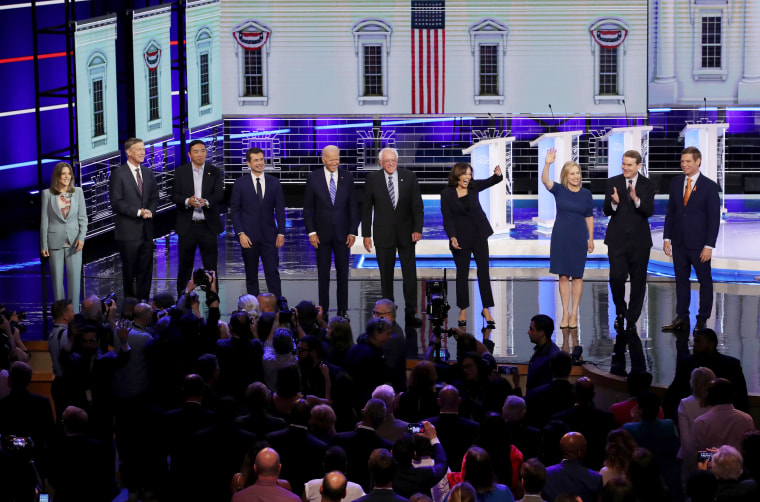The general feeling so far seems to be that Sen. Kamala Harris had a breakthrough night during the second night of the first Democratic debate Thursday. She attacked former vice president Joe Biden on race and upstaged Sen. Bernie Sanders’ ranty grandpa routine. This came one night after a strong performance by Sen. Elizabeth Warren and other progressives who tried to outdo one another in their bid to move the party left in the first night of debate Wednesday.
But — at the risk of inciting the outrage mobs on Twitter — the winner of this week’s debates may actually have been President Donald Trump.
The candidates so far seem intent on alienating socially moderate Trump skeptics, gun owners, fiscal hawks, suburban swing voters and folks who would like to keep their own health insurance.
To be clear, I think a second Trump term would be a disaster. But while Democrats claim they are focused on beating him, the candidates so far seem intent on alienating socially moderate Trump skeptics, gun owners, fiscal hawks, suburban swing voters and folks who would like to keep their own health insurance. In other words, they don’t seem very focused on defeating Trump at all.
The other day, I wrote a piece for Politico listing all the ways that Democrats could guarantee a Trump win. It was meant to a be warning, but instead the leading candidates (with some exceptions) seem to have taken it as a to-do list:
Turn the debates into circular firing squads, check; double down on banning private health insurance, check; profess support for taxpayer funding for abortions and taxpayer-funded medical benefits for illegal immigrants, check; promise lots and lots of free stuff but also lots of new taxes, check; argue for decriminalizing illegal immigration and mandatory gun buybacks, check.
Watching the debates, I thought back to 2016 and the often touted “Forgotten Man.” This time around, the forgotten men (and women) of the 2020 campaign are centrist voters. It is even lonelier for those of us who remain never-Trumpers, as we watch Democrats vie with one another to add items to the Trump campaign playbook.
Yes, it’s early. And yes, it’s primary season when you would expect the parties to focus on their ideological bases. But YouTube is forever and the image of Democrats raising their hands in support of eliminating private health insurance are already being weaponized.
In fairness, many of the candidates (including Biden) seem to understand the toxicity of taking away insurance from millions of Americans. They know it is possible to move toward universal insurance while preserving the ability of Americans to choose whether they want to buy it. Pete Buttigieg said "Medicare for All" should be available to “who want it.” But now we have Warren and Harris joining Sanders at the fringe of the issue.
It is hard to imagine a bigger gift to Trump. But there’s more.
Last night, nearly every hand on stage went up when the candidates were asked if their government health care plan would cover illegal immigrants. In fairness, that is a defensible position. But Trump understands how it will play out next year, as evidenced by his quick Twitter rebuttal:
It is never quite clear what goes on in Trump’s mind, but he understands that next year’s election will not be just a referendum on his shambolic and corrupt presidency: it will be a binary choice between two distinct futures.
And that’s the problem for the Democrats.
There are millions of voters who have been horrified by Trump’s presidency and are open to voting for a reasonable Democratic alternative — but not for a party that ignores or scares them. Watching the debates, it was easy to forget that the election will not be decided on Twitter, but in Pennsylvania, Ohio, Wisconsin and Michigan.
And how will the party’s lurch to the left play in those states? The gun control issue could be a clear winner for Democrats, but how will proposals to license gun owners or “mandatory” buybacks (read confiscation) of guns play in places such as Florida or the upper Midwest?
The GOP’s attack on Roe v. Wade could be a rallying cry for Democrats, but the embrace of unlimited taxpayer funding for abortions all but guarantees that social conservatives will remain solidly behind Trump.
The GOP’s attack on Roe v. Wade could be a rallying cry for Democrats, but the embrace of unlimited taxpayer funding for abortions all but guarantees that social conservatives will remain solidly behind Trump. Student debt is a genuine crisis, but how will voters react to having to pay for wiping out $1.6 trillion in strangers’ debt? How would Sanders’ plan to tax all stock and bond transactions play in a nation of 401K holders?
Voters may recognize the unfairness of the Trump tax cuts, but will they be willing to put the economy and their own personal finances at risk by voting for radical policies that include trillions of dollars of new taxes and sweeping government regulation of the economy?
And are they really ready for nationalized health insurance that could cost more than $30 trillion over the next decade? With trust in government at historic lows, do voters really want to turn over that much power to a federal government? The attack ads write themselves, but they won’t have to — Trump's campaign has money to burn, and it's going to spend a lot of that money making the case that Democrats are dangerous extremists.
The frustration here is that Trump is eminently beatable and Americans are clearly ready to move on from Trumpism. But this is the problem of our bubble politics — including the politics of the blue bubble. Right now, progressives are talking to one another, not center-right swing voters.
If the Democrats want to beat Trump that will have to change. Soon.

